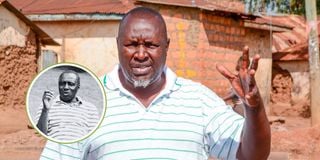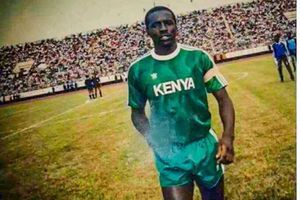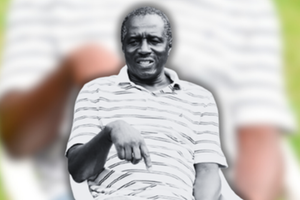
Richard Omondi Odhiambo alias 'Makamu' and (inset) football legend the late Austin Oduor 'Makamu'.
On the morning of September 10, 2023, Jane Anyango arrived at Usenge beach in Siaya County in search of her former son-in-law, Jared Opiyo.
Ms Anyango had gone to inform Mr Opiyo that his estranged wife, Rose Atieno, had passed away.
The first two fishermen she found at the beach did not recognise Mr Opiyo by the names Ms Anyango provided. The response was the same when she approached several other fishermen who were arriving in boats loaded with fish from the lake.
Around midday, just when Ms Anyango was about to give up, another boat docked at the beach with more fish pulling a huge crowd of fishmongers.
It is then that Anyango spotted her son-in-law jumping into the boat, and she quickly ran towards him, shouting his name. Her voice attracted a group of fishermen whom she had earlier sought help from, and one of them remarked,
“Madam, so it is Nyang’ you were looking for?! You could have said so! This guy has been sleeping inside the fish banda over there all this time!”
As it turned out, Mr Opiyo’s colleagues had nicknamed him ‘Nyang’, a dholuo name for crocodile, a few days after he arrived at Usenge beach due to his agility in the water. He was a ferocious swimmer who was not cowed by strong waves.
A nickname is defined by the dictionary as a familiar or humorous name given to a person or thing instead of, or as well as the real name.
While some nicknames may fizzle out with time, others can be so stubborn to the extent that they threaten to erase one’s original identity.
Take the case of Richard Omondi Odhiambo, a familiar figure in the Orange Democratic Movement (ODM) grassroots politics in Nyanza, for instance.
If you were to mention the name ‘Makamu’ to anyone on the streets of Kisumu today, chances are that 95 per cent of them would not relate the name to Mr Omondi.
Mr Omondi is known by his nickname, ‘Makamu’, which he acquired way back in 1983.
“We had an inter-polytechnics football league where I played position five for my team, so they nicknamed me Austin Makamu Oduor, who was a popular defender for Gor Mahia FC, because of my exemplary performance at the defence,” says Mr Omondi.
Coincidentally, Gor Mahia fans had also nicknamed Austin Oduor as ‘Makamu’.
And just like that, a man bearing a new identity was born. Today, it is only Mr Omondi’s mother and very close relatives who still identify him by his official names.
“There’s a time I requested Honourable Olago Aluoch, the former MP for Kisumu West Constituency, to help me delete ‘Odhiambo’ and replace it with ‘Makamu’ so that my full name could read as, Richard Omondi Makamu. Mr Olago advised me to swear an affidavit but I developed cold feet when I realised that I was going to lose my surname. ‘Odhiambo’ is my father’s name and I cannot replace my father’s name with a nickname” says Mr Omondi.
“There are people who, after sending me money via M-Pesa, get shocked when they notice that my official name is not Makamu,” he adds with a smile.
Several kilometres away in Seme Sub-county we met Domnic Juma Ouko. However, in his village called Kombija, they recognise him as ‘Adari’ - a dholuo word meaning Eviction or Ejection.
A story is told of how Adari stormed Nyatigo Primary School one afternoon in 1972 armed with his father’s sword and a shield to eject a teacher who had reprimanded him ‘unjustly’.
“That teacher was notorious for meting out outrageous punishments to learners. He was also too arrogant, the reason why I decided to eject him. When his colleagues saw me entering the school compound, they scampered. But he stayed put pretending to be unshaken, however fear got hold of him when I charged towards him with my weapons and he ran away. Suddenly, the whole school took off with some of the pupils seeking refuge on trees. So that’s how the nickname ‘Adari’ was born,” recalled Mr Juma.
Even though this incident happened almost five decades ago, the name has stuck to this date.
“Even if you tell anyone at the Kisumu bus park that you want to visit Juma Adari, you will be brought to my home, you can’t get lost,” says Mr Juma with pride.
A few kilometers away in Kadinga village we find ‘Angola’ whose real name is Obiayo Odongo. Mr Odongo was a no nonsense footballer on the pitch during his youth. His nickname, ‘Angola’, was derived from the unrest that was witnessed during the Angolan civil war of 1975.
“Football fans nicknamed me Angola because I was a ruthless defender on the pitch. I could deal firmly with players of the opposing side who tried to play rough,” says Mr Odongo.
He was 18 years old when he earned himself the nickname, now he is 78 but the moniker won’t go away.
“After trying unsuccessfully for several decades to make it disappear I finally decided to let it stay. I also came to realise that the more you fight with the people who call you by your nickname the harder the name sticks,” explains Mr Odongo.
Perhaps other reasons why Angola has embraced his nickname are the fringe benefits he sometimes reaps from it.
“During the period I was living in Nairobi, whenever I went to the stadium to watch a football game my friends like Ouma Oletunda would allow me in free of charge while extolling my fame. So that name has literally opened gates for me,” he says with pride.
And then there is Peter Gwara Okeyo popularly known in his Kang’ano Village as ‘Marende'.
“When I returned to the village from Nairobi after the general election of 2007, people would constantly seek my opinion on politics since they believed that I was more informed by virtue of having lived in the capital city. Soon, they made me the Speaker of the local ‘Bunge La Wananchi’ and nicknamed me ‘Marende’, after Kenneth Marende - the former Speaker of the National Assembly,” says Mr Gwara.
According to William Hazlitt, an English essayist, drama and literary critic, a nickname is the hardest stone that the devil can throw at a man.





